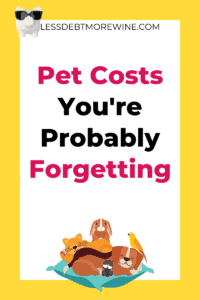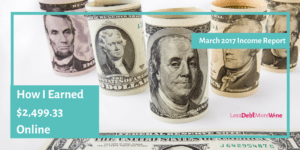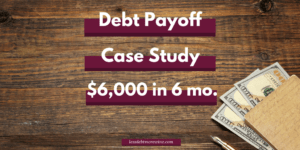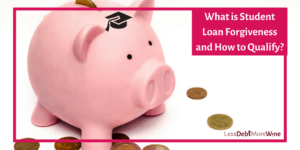Dave Ramsey’s Baby Steps – How They’re Hurting Your Finances & What to Do Instead
THIS POST MAY CONTAIN AFFILIATE LINKS. MEANING I RECEIVE COMMISSIONS FOR PURCHASES MADE THROUGH THOSE LINKS, AT NO COST TO YOU. PLEASE READ MY DISCLOSURE FOR MORE INFO.
I’m sure you agree that personal finance is personal.
Which means but no one set of rules is going to fit exactly right for everyone.
Perhaps the most well known set of personal finance rules are Dave Ramsey‘s baby steps. Now, while it’s impossible to expect those steps work for everyone, there are actually some big financial missteps buried in those baby steps.
In this post I’m going to break down why some of Dave Ramsey’s baby steps might not work for you and which baby steps could actually cause more financial harm than good.
Here are Dave Ramsey‘s baby steps:
1: Save $1,000 to start an emergency fund
2: Pay off all debt using the debt snowball method
3: Save 3 to 6 months of expenses for emergencies
4: Invest 15% of your household income into Roth IRAs
5: Save for your children’s college fund
6: Pay off your home early
7: Build wealth and give
Breaking down step #1 – Saving an emergency fund
Dave Ramsey‘s first baby step to save for an emergency fund is a good one, but his idea only save $1000 probably isn’t the best suggestion.
While a thousand dollars is great to start I wouldn’t move on until you saved a bit more.
As a general rule of thumb I look I like to look at how much my last emergency cost and then multiply it by three. Because when it rains it pours and you don’t want your emergency fund completely wiped out by just one emergency.
It’s also a good idea to take stock of what is going to actually be considered an emergency to justify using your emergency fund.
For example, tickets to go see Hamilton probably not an emergency. Needing to replace the battery in your car probably a good use of the emergency fund.
New Baby Step: Save enough for three emergencies
Related:
- 6 Steps to Build Savings
- Here is Where You Need to Stash Your Emergency Savings
- How to Best Build Savings
via GIPHY
Baby Step #2 Pay off Debt Using the Snowball Method Debt Nor’Easter Method
Dave Ramsey recommends the snowball method when it comes to debt repayment.
With the debt snowball you pay off your debts in order of the smallest balance first to the greatest balance. So you make all the minimum payments to all of your debt and then put any extra money towards paying off the small balance first.
And while I understand the suggestion of the debt snowball, it’s not really the best method.
It can actually end up costing you money. Generally speaking, the most fiscally sound debt repayment method is the debt avalanche method.
The debt avalanche method has you pay off your debts in order of highest interest-rate to lowest. Ensuring you save or save the most money on interest.
But the reason the debt snowball a suggested is because of the momentum you feel when you knock out that first that it keeps you motivated to keep going. Which you don’t get with the debt avalanche method. And while the avalanche method will save you more money it’s hard to keep you motivated.
This why I actually recommend with that debt nor’easter method.
The debt nor’easter method has your pay off your debt in the order which will provide you the greatest financial gain. If you have different kinds of debt, you want to focus on paying off the debt that is going to help you move the needle forward on improving her overall financial landscape.
For example credit, Credit card debt is revolving and if you’re maintaining balances on your credit cards that can impact your credit score negatively. If you’re carrying balances upwards of 30% of your overall credit limit or more it’s going to start taking a toll on your credit score.
A lower credit score could cost you more money down the road, be it a higher interest-rate on another loan or having to put down a larger deposit when you move.
So paying off your credit cards would serve your overall financial landscape best, rather than paying off your student loans. With the debt nor’easter what the lowest balance or the highest interest-rate doesn’t matter, you want to pay off whatever is going to have the greatest positive impact on your finances.
New Baby Step: Pay off your debt using the debt nor’easter method
Related:
- Debt Payoff Case Study: How I Paid Off $6,000 in 6 Months Using the Debt Nor’Easter Method
- 5 Apps that Help You Payoff Your Debt
- How Qoins Will Help You Destroy Debt Faster
Baby Step #3: Save 3-6 months of expenses
I actually don’t have any real problems with baby step number three. Once you’re debt free, you should absolutely work on building up your savings.
And 3 to 6 months of savings is pretty good.
But I graduated into the recession and while the economy is nothing like it was then, it made me a bit more cautious, having experienced how difficult it can be to find a job. So personally I would feel more comfortable and would recommend saving up a years worth of expenses.
New Baby Step: Save 3-12 months of expenses
Related:
Baby Step #4 Invest 15% into Roth IRAs
Now, in Dave Ramsey’s world, to get to this baby steps you shouldn’t have been investing at all while you were paying off debt.
I fundamentally disagree with that, especially if your employer offers a 401(k) match program.
If you have a traditional job and your job offers 401(k) matching you should absolutely 100% take advantage of that even when paying off debt.
Because if you don’t, you’re missing out on 100% return on your investment, free money, and any interest that could’ve accumulated on that money as well.
Because the longer money has to grow in an investment, the better off you’ll be, meaning you won’t have to worry about catching up as much later on.
That being said, assuming you do put money towards your 401(k) once you’re debt-free, I think you should increase your contribution and then maybe even invest in a Roth IRA as well.
Depending how much money you’re making you should definitely aim to max out your 401(k). Current law allows you to put away little over $18,000 per year into your 401(k) and have it be tax deferred. If you want to invest on top of that you can open up an account with a company like Betterment or Vanguard.
Baby Step #5 Save for your children’s college fund
Up to you. (I don’t have kids)
Let me just say, I don’t have kids, so I don’t really have much of an opinion on this, saving for your kids college.
That being said, I don’t think you HAVE to pay for your children’s college. My parents didn’t pay for mine. I think it’s totally fine.
You could save and require your kids to pay you back that way they don’t have to take out student loans. My parents help me out that way.
Really, I think it’s a personal choice and if you want to totally skip this baby step because you don’t have kids or you just think they should pay for college, go right ahead.
New Baby Step: Save for kids college or don’t
Baby Step #6 Pay Off Your Home Early
First, does it really make sense? Could you earn more investing that extra money?
I don’t own a home so I don’t have as much invested in this baby step.
However, from a financial standpoint you need to decide if it makes sense to pay off your house early.
If you have really low interest rate on your mortgage and that money could be earning a higher interest-rate elsewhere it might make more sense to just keep on your scheduled repayment for your mortgage and save or invest the extra money.
New Baby Step: Only pay off your home early if you can earn money at a higher interest rate than your mortgage loan.
Find out why Tasha & Joseph from One Big Happy Life aren’t following Dave Ramsey’s baby steps and paying off their house early in this video:
#7 Build Wealth & Give
Okay, this one, I’ve got no beef with Ramsey. Build wealth and give? Yes and why not?
You should definitely build your wealth and there’s a lot of different ways you can do that.
As for giving, I think it’s a personal choice. Dave Ramsey tends to inject religion into his financial teachings, if you’re not religious then don’t worry about what he has to say.
Though you don’t have to be religious in any way to want to give back or just give. Just because someone else is choosing to give , you don’t have to give away your money in any form or give away your time it is a completely personal choice.
New Baby Step: Definitely build wealth, give if you want to
Related:
Bottom Line
The bottom line is that while Dave Ramsey‘s baby steps might be a good place to to start, just to get some sort of direction with your finances, chances are you won’t and shouldn’t follow them exactly. At least not if you want to make the most of your money. See my revised baby steps below.
One. Save an emergency fund that could cover a minimum of three emergencies
Two. Focus on paying off that using the debt nor’easter method. Do not for go your company match to invest in retirement while you pay off debt.
Three. Save up a years worth of expenses
Four. Invest to at a minimum max out your 401(k) and any other retirement accounts you have then if you can save more, save more
Five. Save up for college funds or not.
Six. Decide if paying off your house is going to be the best financial move for you. Look at what your interest rate on your mortgage is and what kind of interest you could earn putting that money elsewhere.
Seven. Build your wealth, do it how it suits you best and if you want to give, do it in a way that works for you.






Thanks Liz.
There’s a lot of wisdom here.
It is hard to give advice that works for everyone. Ramsey’s method is battle-tested by a lot of listeners though. I do agree with you that it can be improved though.
I have never had a fixed savings rate. If I plotted it, it would be all over the map. I figure out how much cash I burn through each month to live. I send that amount to my checking account as a “paycheck.” All the rest gets invested along with any investment income. That allows me to not only max out all the tax-advantaged accounts but to invest in taxable funds too. It helps to keep a check on lifestyle creep. The savings rate went up with bonuses and raises, but down when I worked in academia and that is okay.